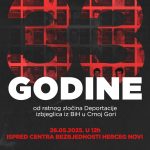
33 years since the crimes of the deportation of refugees – call for a memorial gathering
23/05/2025
Meeting held regarding the initiative to erect a memorial to the victims of the 1992 deportation
28/05/202533 YEARS SINCE THE UNPUNISHED WAR CRIME OF THE DEPORTATION OF BOSNIAN-HERZEGOVINIAN REFUGEES COMMEMORATED – HERCEG NOVI OFFICIALS PROMISED A MEMORIAL FOR THE VICTIMS
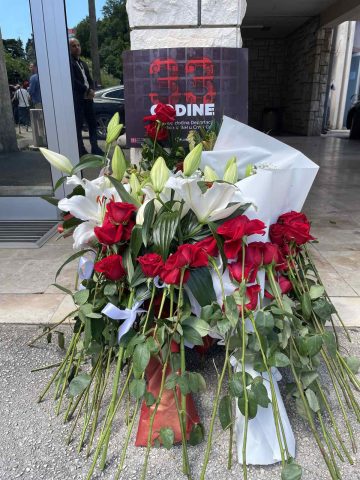
A memorial gathering was held yesterday at noon in front of the Security Department of Herceg Novi to mark the 33rd anniversary of the war crime involving the deportation of Bosnian-Herzegovinian refugees. The event, organized by Human Rights Action (HRA), the Centre for Civic Education (CCE), and ANIMA – Center for Women’s and Peace Education, was attended by family members of five victims of the crime, representatives of the Government and Parliament of Montenegro, the Ombudsman, leaders of the Bosniak Council, representatives of the Islamic Community, international organizations, embassies, political parties, non-governmental organizations, the media, and citizens.
Despite high expectations, this year’s anniversary was once again marked without a renewed criminal investigation, without a memorial, and without a designated day of remembrance for the victims.
However, just prior to the commemoration, a promising meeting was held with the Mayor of Herceg Novi and the President of the Municipal Assembly. Tea Gorjanc-Prelević, Executive Director of Human Rights Action, expressed hope that “this may be the first day of the year when we will finally see the memorial built.” She also called on Herceg Novi to engage with the victims’ families.
“What happened to them in this town should never have happened. It was tragic, unjust, and shameful to send people who were seeking refuge back to their executioners. There was no justification. Authorities knew what would happen. Some honourable police officers were concerned and even freed some of those arrested,” Gorjanc-Prelević emphasized. Her entire speech in Montenegrin is available here.
Minister of Culture and Media Tamara Vujović stated that the wounds from this crime still hurt, even after 33 years.
“How could such a crime have happened? It’s difficult to comprehend, but it is healing to remember and speak about it — to face the possibility that someone close to us may have been a participant or executor of such an order. Why did they not raise their voice, confront their superior, their chief, their minister?” asked the Minister of Culture and Media. Her entire speech is available here.
Minister of Social Welfare, Family and Demography Damir Gutić said that Montenegro must right the wrongs of its past by bringing perpetrators and those who ordered this crime to justice.
“The second thing we must do is ensure peace for the souls of the victims — to find their remains and lay them to rest with dignity. Families deserve a place to go and to know that their loved ones are buried there. Furthermore, we must establish a memorial here, and I call on the Municipality of Herceg Novi and the Ministry of Culture and Media to support the erection of this monument,” Gutić added. His entire speech is available here.
Minister for Human and Minority Rights Fatmir Gjeka stressed the importance of building a society where every person feels safe, dignified, and respected, regardless of background, religion, nationality, or any other identity.
“Confronting the past is a measure of a society’s moral maturity. We must learn from past mistakes and foster a culture of remembrance and respect as a foundation for peace, reconciliation, and coexistence. It is our duty and moral obligation to teach future generations to resist nationalism, religious intolerance, and hatred.” His entire speech is available here.
State Secretary at the Ministry of Interior Novica Obradović noted that the site serves as a stark reminder of human suffering, institutional failure, and the importance of collective memory.
“We are not only paying tribute to the victims, but also affirming Montenegro’s commitment to truth, justice, and the dignity of every individual, regardless of origin, faith, or ethnicity. By nurturing a culture of remembrance and speaking openly about difficult chapters in our past, we are not dividing society — we are building the foundations of trust and reconciliation,” Obradović said. His entire speech is available here.
The Ombudsman of Montenegro, Siniša Bjeković, remarked that while Montenegro has shown much warrior courage, it has lacked civic courage.
“We cannot speak of the rights of those who are no longer with us. They had the right to life, to be with their families, to escape torture and persecution, to love, to learn, to be equal. But they weren’t granted those rights. The memorial, once built, will not only honour the victims — it will stand as a monument to an era of dormant awareness and conscience,” Bjeković said. His entire speech ih available here.
Family members of the victims also addressed the gathering. Hikmeta Prelo, mother of Amer Prelo, the youngest victim of the deportation (aged 18), recalled how her son, brother, and brother-in-law were taken in May 1992.
“They said it was for ‘questioning,’ but there was no questioning. I have not even the bones of my child, my brother, or my brother-in-law. I live on, while dark days pass. I just want what was promised today to be fulfilled — that when I pass by, I can see that plaque, read that name, and have a place to remember,” said Prelo. Her entire speech is available here.
Sejda Krdžalija, mother of 22-year-old Sanin Krdžalija, also called for the victims to be honoured with a memorial.
“Last time I was here, everyone promised — next time we come, it will be for the unveiling of the memorial. I thank all of you, especially those we met with this morning — the Mayor and Assembly President of Herceg Novi — who offered support and promised it would happen. I hope our next visit will be to the memorial’s unveiling. That is the least that can be done after what happened,” Krdžalija said. Her entire speech is available here.
Alen Bajrović, son of victim Osmo Bajrović, thanked Mayor Stevan Katić and Assembly President Miloš Konjević for “opening the door to the victims and extending a hand,” with a promise to support construction of the memorial at the police station site.
He recalled the tragic events of May 1992 and urged Montenegrin institutions to prosecute those responsible.
“We still don’t know the exact number of those detained — those are just estimates — let alone what happened to them. I’m still searching for my father’s remains. I expect the Special Prosecutor’s Office to open this case and bring to justice all those who participated in this war crime — from the direct perpetrators to the masterminds and those in positions of command authority at the time,” Bajrović said. His entire speech is available here.
Ervina Dabižinović, coordinator at ANIMA – Centre for Women’s and Peace Education, said that it is painful to hear repeated promises each year, because the erection of the memorial is not just an act of respect for the victims, but a necessary step toward societal responsibility.
“The state knew exactly what would happen to them. Yet, to this day, no accountability has been established. It’s hard to speak without also saying that the Ministry of Culture and the Ministry of Education must be the strongest drivers of introducing war crimes education in Montenegro. The plaque will mark that a state crime occurred — but it will also say we are ready to ensure future generations never repeat what we once did,” Dabižinović stated. Her entire speech is available here.
Džemal Dacić, imam and envoy of the Islamic Community’s religious leader in Montenegro, called for the fostering of dialogue, which he said is essential to any modern society — particularly in our context, burdened by a troubled past.
“If we strive to build that dialogue and are willing to acknowledge the failings of our past, then we will truly face one another — we will look each other in the eye, extend a hand, and together assume shared responsibility. That is how we can truly enhance our coexistence,” Dacić added. His entire speech is available here.
Damir Suljević, Human Rights Coordinator at the Centre for Civic Education, said that today in Herceg Novi, we are not only remembering but also warning that forgetting can be a form of complicity.
“We also want to highlight the inappropriate naming of a street, which can be a new wound, because respect for victims is measured not by statements, but by facts, responsibility, empathy — and a memorial that we are still waiting for,” Suljević added. His entire speech is available here.
Representative of the Youth Initiative for Human Rights, Amina Murić, emphasized that crimes that remain unpunished continue to live on in other forms — through hate speech, nationalism, intolerance, and violence among youth.
“It is important that we know what happened. Not to remain stuck in the past, but to prevent it from happening again… Democracy is not only killed by weapons; it is also killed by silence. That is why all of us here today choose to speak out and remember,” Murić stated. Her entire speech is available here.
Demir Ličina, President of the Association “Štrpci – Against Oblivion,” apologized on behalf of Montenegro to the victims’ families for the committed crime and expressed support for calls to establish a memorial in front of the Herceg Novi Security Department.
“Make the decisions. That is the simplest step. Only then will the memorial be built,” Ličina stressed. His entire speech is available here.
In addition to those mentioned, the gathering was attended by Sanela Krdžalija, sister of the deceased Sanin Krdžalija, Amer Prelo’s aunt, and Himzo Čengić’s sister, Fikreta Hadžić. Also present were the Minister of Regional Investment Development and Cooperation with NGOs, Ernad Suljević; Deputy Speaker of the Parliament of Montenegro, Mirsad Nurković; MPs Amer Smailović and Edina Dešić. From the Ministry of Interior, General Director of the Directorate for Security and Surveillance Affairs Zoran Kujović and Chief of the Security Department in Herceg Novi Dragan Kontić attended, along with police officers. State Secretary Marko Marković represented the Ministry of Defence.
Representing the Ministry of European Affairs, Montenegro’s Chief Negotiator with the European Union, Predrag Zenović, attended the anniversary marking the deportation of refugees. From the Office of the President of Montenegro, associates Marija Vesković and Drago Šundić were present. The Ambassador of Bosnia and Herzegovina to Montenegro, Branimir Jukić, also attended. The Special State Prosecutor’s Office was represented by legal advisor Branko Vujisić. From the Municipality of Herceg Novi, Secretary of the Secretariat for Ecology and Energy Efficiency, Aleksandar Božović, as well as local parliament councilors were present.
Among the participants were also representatives of UNDP Montenegro, political parties (URA, SDP, SD, Bosniak Party, Liberal Party), and non-governmental organizations (Association Štrpci – Against Oblivion, Centre for Nonviolent Communication from Sarajevo, Association of War Victims Foča 92–95, Youth Initiative for Human Rights, Civic Alliance).
FACTS
According to available state documents, at the end of May 1992, Montenegrin police arrested and deported over one hundred individuals, including at least 66 Bosniak Muslims, 33 Serbs, and two Croats from Bosnia and Herzegovina. However, data from the researcher of this crime, Šeki Radončić, indicate that as many as 105 Muslims were deported, with a total number of 143 people.
The Serbs were mobilized into the Army of the Republika Srpska, and there are no records of anyone dying as a result of the deportation. On the other hand, Bosniak Muslims, or persons whom the police presumed to be of that nationality, were handed over to that army as hostages, supposedly to be used in prisoner exchanges for captured Serb fighters. However, almost no one was exchanged. The majority were killed. Those deported from Herceg Novi on May 25 mostly perished in the Foča camp, while others deported on May 27 to Bratunac were killed there. Their bodies have still not all been found. Only twelve survived the transfer to concentration camps.
Other Muslim refugees were also arrested in Bar, Podgorica, or areas near the border with Bosnia and Herzegovina at the end of May and June 1992 and were deported individually to the Foča camp or handed over to agents of Republika Srpska, after which their whereabouts remain unknown.
THREE INITIATIVES
Fourteen years ago, in 2011, HRA, CCE, ANIMA, and then-member of the Council for Civic Oversight of Police Work Aleksandar Saša Zeković submitted three initiatives:
- To the then Speaker of the Parliament of Montenegro, Ranko Krivokapić, and all parliamentary club leaders, requesting the proclamation of a Day of Remembrance for the victims of the 1992 refugee deportation crime;
- To the then Prime Minister of Montenegro, Igor Lukšić, Minister of Interior Ivan Brajović, Minister of Culture Branislav Mićunović, and the then President of the Herceg Novi Municipal Assembly, Dejan Mandić, requesting the erection of a memorial for the victims of the 1992 refugee deportation in front of the Police Administration building in Herceg Novi, in support of the families’ wishes expressed in Herceg Novi in 2010;
- To the Montenegrin police, urging them to issue an apology for the unlawful arrests and handover of refugees to the enemy army of the Republika Srpska.
These initiatives have been repeated over the years. In May 2021, the first initiative was reiterated to the then Speaker of the Parliament, Aleksa Bečić, who responded that changing the Law on State and Other Holidays would be necessary to achieve this but took no action to initiate the change.
The second initiative was repeated in September 2021, addressed to the President of Herceg Novi Municipality, Ivan Otović, the Municipal Assembly, its council groups, and then Minister of Education, Science, Culture and Sports, Vesna Bratić. No response was received.
Last year, together with the Bosniak Council, the same initiative was sent to the President of Herceg Novi Municipality, Stevan Katić, the President of the Municipal Assembly Ivan Otović, and all local parliament members. As no reply was received, the initiative was sent again on May 7 this year to the President of Herceg Novi Municipality, along with a request for a meeting to discuss the matter.
Mr. Katić, shortly before the memorial gathering, held a meeting together with the President of the Municipal Assembly of Herceg Novi, Miloš Konjević, and their associates, with the families of the victims and HRA, which represented the initiators of the proposal. Representatives of the Municipality encouraged us to, in cooperation with the Ministry of Culture and the Ministry of Interior, and with their support, renew the initiative for the construction of the memorial.
The third initiative is the only one officially accepted — it was realized in 2022 when the Director of the Police Administration, Zoran Brđanin, and Minister of Interior, Filip Adžić, attended the memorial event in Herceg Novi marking the 30th anniversary of the crime. On that occasion, they issued a public apology to the victims and their families for the actions of the Montenegrin police.
Furthermore, in August 2023, the President of Montenegro, Jakov Milatović, during a meeting with Alen Bajrović, son of Osma Bajrović (a victim of the deportation), and representatives of HRA, CCE, and ANIMA, publicly apologized on behalf of the state for the crime. He also issued a statement yesterday urging relevant state authorities not to abandon efforts to establish responsibility for the perpetrators and to locate the remains of the victims.
Human Rights Action (HRA)
Centre for Civic Education (CCE)
ANIMA – Centre for Women’s and Peace Education
Photograpger: Vuk Ilić







































































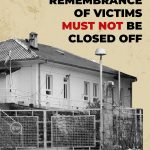
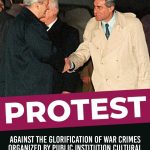
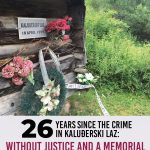
 English
English